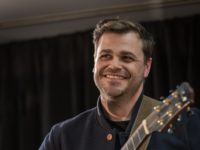“I love making albums!” declared super session guitar player Lee Ritenour, and he continues: “For me, creating a new project from beginning to end, is one of the most musically and spiritually rewarding things that I do in my life.” I’d probably love making albums too, if I can also get this kind of talent to play on it: Chick Corea, George Duke, Stanley Clarke, Marcus Miller, Dave Grusin, Christian McBride, Dave Weckl, Vinnie Colaiuta, Melvin Davis, Larry Goldings, Patrice Rushen, Peter Erskine, Alan Pasqua, Will Kennedy and Tal Wilkenfeld. Not to mention getting the likes of Kurt Elling and South Africa’s Zamajobe to come sing on a couple of tracks.
Like his last album 6 String Theory (2010), Ritenour decided to make a record by pulling out some of the biggest guns ever to enter a recording studio. Whereas that last record was a pairing of Rit and a different iconic guitar player on each track, Rhythm Sessions directs its attention on stellar backing behind his guitar. The record also serves as an opportunity to showcase emerging talent brought to fore by Ritenour and Grusin’s first annual 6 String Theory International Rhythm Section Competition, by assembling the winners of that competition to cut a track on Rhythm Sessions (Ritenour also organizes a 6 String Theory guitar competition, which recently completed its third such annual event.)
Since I already dropped some big names of the past and present, here are some big names of the future, the winners of that competition from earlier this year: pianist Demetrius Nabors, organist Hans De Wild, drummer Selim Munir and bassist Michael Feinberg.
[SOMETHING ELSE! REWIND: In highlighting the musical accomplishments of Elvin Jones and his various bass partners, 2012 International Rhythm Section Competition winner Feinberg revealed much about himself. He was meticulous in the material he chose and the selection of musicians who played these pieces with him. The Elvin Jones Project is ostensibly a look back at one career, but it’s just as much about the advancement of another.]
In a career reaching back to the early 70s, Ritenour has made more than 45 records and his first album as a solo artist appeared in 1976. He looks nearly as youthful today as he did then, and the music on these tracks sounds much as it did during his GRP days of the 80s and 90s. That is, it’s a style of music where pop-jazz, fusion jazz and smooth jazz overlap, with a light Brazilian flavor occasionally tossed in. The sheet music might be sophisticated but the presentation won’t be abrasive to any eardrums. Take, for instance, Corea’s hypnotic vamp “Children’s Song #1,” a song where Ritenour puts the emphasis squarely on Chick’s compelling circular melody.
Meanwhile the licks — guitar and otherwise — are tasty as it gets. Rit and Duke (on Moog) get in some delectable ones on “The Village,” for instance. For some, all this might be too tasty and the music too smooth, but the production is clean and warmer than it was during the GRP days, and the arrangements do often leave ample room for chops, as on Herbie Hancock’s “Fat Albert Rotunda” which is double funky because there’s double the bass: Marcus Miller and Melvin Lee Davis.
Vocal tracks on a mainly instrumental album will more times than not come off as token efforts, but there’s nothing token about Elling’s discriminating take on Nick Drake’s mystical “Riven Man.” Zamajobe takes on the Stereophonics’ “Maybe Tomorrow” in the same pop vein, perhaps the most likely song to be spun off as a single, but also the least indicative of the vibe heard on the rest of the album.
On, and about that track performed by Ritenour and the 6 String Theory International Rhythm Section Competition winners? “Punta Del Sol” is one of Grusin’s better known tunes, a soft funk number that’s piano and bass heavy. Rit and his young colleagues play it pretty straight compared to the original, but there are passages that highlight various instruments, especially Feinberg’s and Nabors’, giving them a chance to show their ability to perform as both soloists and accompanists.
Like Marcus Miller, Lee Ritenour is a very talented musician who over the course of a long career has occasionally tackled material beneath his abilities, but can also make a quality contemporary jazz album even today when he commits himself to do it and throws his considerable prowess behind it. And like Miller’s Renaissance, that’s just what Ritenour did for Rhythm Sessions.
Rhythm Sessions is slated for release September 25, by Concord Music Group. Visit Lee Ritenour’s website for more info.
[amazon_enhanced asin=”B008OIQYTG” /] [amazon_enhanced asin=”B003K025TQ” /] [amazon_enhanced asin=”B003T70EWA” /] [amazon_enhanced asin=”B000092PT5″ /] [amazon_enhanced asin=”B0012GN0LM” /] [amazon_enhanced asin=”B0000001QN” /] [amazon_enhanced asin=”B0000001SN” /]
- Christian Marien Quartett – ‘How Long Is Now’ (2024) - April 18, 2024
- Dave Douglas, feat. James Brandon Lewis – ‘Gifts’ (2024) - April 11, 2024
- Thollem – ‘Worlds In A Life, Two’ (2024) - April 8, 2024


